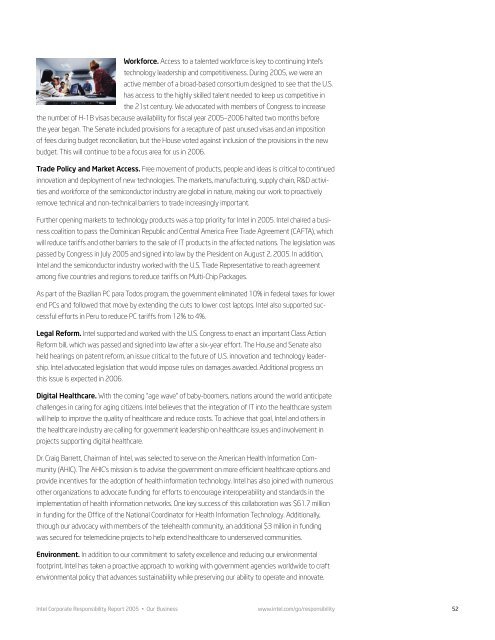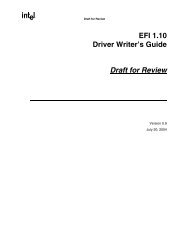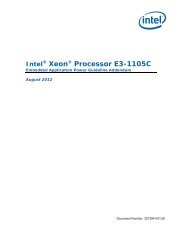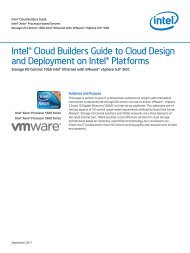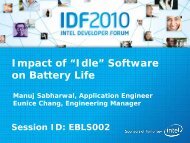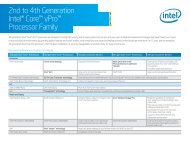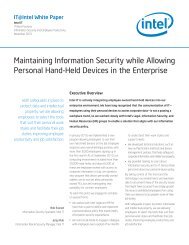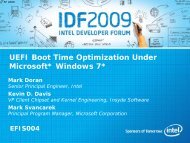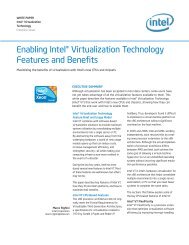Download - Intel
Download - Intel
Download - Intel
Create successful ePaper yourself
Turn your PDF publications into a flip-book with our unique Google optimized e-Paper software.
Workforce. Access to a talented workforce is key to continuing <strong>Intel</strong>’s<br />
technology leadership and competitiveness. During 2005, we were an<br />
active member of a broad-based consortium designed to see that the U.S.<br />
has access to the highly skilled talent needed to keep us competitive in<br />
the 21st century. We advocated with members of Congress to increase<br />
the number of H-1B visas because availability for fiscal year 2005–2006 halted two months before<br />
the year began. The Senate included provisions for a recapture of past unused visas and an imposition<br />
of fees during budget reconciliation, but the House voted against inclusion of the provisions in the new<br />
budget. This will continue to be a focus area for us in 2006.<br />
Trade Policy and Market Access. Free movement of products, people and ideas is critical to continued<br />
innovation and deployment of new technologies. The markets, manufacturing, supply chain, R&D activities<br />
and workforce of the semiconductor industry are global in nature, making our work to proactively<br />
remove technical and non-technical barriers to trade increasingly important.<br />
Further opening markets to technology products was a top priority for <strong>Intel</strong> in 2005. <strong>Intel</strong> chaired a business<br />
coalition to pass the Dominican Republic and Central America Free Trade Agreement (CAFTA), which<br />
will reduce tariffs and other barriers to the sale of IT products in the affected nations. The legislation was<br />
passed by Congress in July 2005 and signed into law by the President on August 2, 2005. In addition,<br />
<strong>Intel</strong> and the semiconductor industry worked with the U.S. Trade Representative to reach agreement<br />
among five countries and regions to reduce tariffs on Multi-Chip Packages.<br />
As part of the Brazilian PC para Todos program, the government eliminated 10% in federal taxes for lower<br />
end PCs and followed that move by extending the cuts to lower cost laptops. <strong>Intel</strong> also supported successful<br />
efforts in Peru to reduce PC tariffs from 12% to 4%.<br />
Legal Reform. <strong>Intel</strong> supported and worked with the U.S. Congress to enact an important Class Action<br />
Reform bill, which was passed and signed into law after a six-year effort. The House and Senate also<br />
held hearings on patent reform, an issue critical to the future of U.S. innovation and technology leadership.<br />
<strong>Intel</strong> advocated legislation that would impose rules on damages awarded. Additional progress on<br />
this issue is expected in 2006.<br />
Digital Healthcare. With the coming “age wave” of baby-boomers, nations around the world anticipate<br />
challenges in caring for aging citizens. <strong>Intel</strong> believes that the integration of IT into the healthcare system<br />
will help to improve the quality of healthcare and reduce costs. To achieve that goal, <strong>Intel</strong> and others in<br />
the healthcare industry are calling for government leadership on healthcare issues and involvement in<br />
projects supporting digital healthcare.<br />
Dr. Craig Barrett, Chairman of <strong>Intel</strong>, was selected to serve on the American Health Information Community<br />
(AHIC). The AHIC’s mission is to advise the government on more efficient healthcare options and<br />
provide incentives for the adoption of health information technology. <strong>Intel</strong> has also joined with numerous<br />
other organizations to advocate funding for efforts to encourage interoperability and standards in the<br />
implementation of health information networks. One key success of this collaboration was $61.7 million<br />
in funding for the Office of the National Coordinator for Health Information Technology. Additionally,<br />
through our advocacy with members of the telehealth community, an additional $3 million in funding<br />
was secured for telemedicine projects to help extend healthcare to underserved communities.<br />
Environment. In addition to our commitment to safety excellence and reducing our environmental<br />
footprint, <strong>Intel</strong> has taken a proactive approach to working with government agencies worldwide to craft<br />
environmental policy that advances sustainability while preserving our ability to operate and innovate.<br />
<strong>Intel</strong> Corporate Responsibility Report 2005 • Our Business<br />
www.intel.com/go/responsibility<br />
52


